-Contributing Editor-
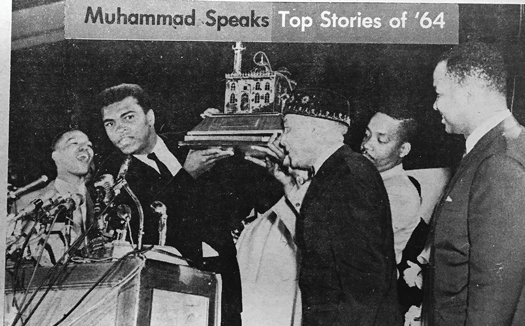
CHICAGO–An overflow crowd at Mosque Maryam on the city’s South Side poured onto the streets June 12 following an insightful message by the Honorable Minister Louis Farrakhan on the life of Muhammad Ali and his relationship to the Most Honorable Elijah Muhammad, who gave Mr. Ali the foundation to defy the most powerful government in the world.
It was the attempted whitewashing of this history by the mainstream media and hardly a mention about Elijah Muhammad from speakers at the services for the fallen champ that moved Min. Farrakhan to “set the record straight” about Mr. Ali’s rise to prominence.
“When they told me that my brother (Ali) had passed I went into a depression,” Min. Farrakhan told the crowd. “We knew Ali from a different perspective. White folks have never liked Black folk who stood up for their own people.”
After the meeting, listeners offered their views on what they heard.
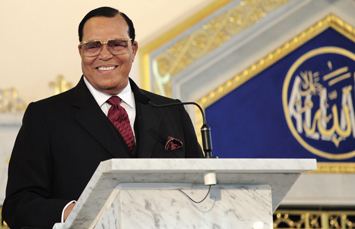
“I was disappointed that the speakers at the memorial service for Ali didn’t mention the Nation,” commented Rhonda Payne of Chicago. “The only person I heard mention the name of the Hon. Elijah Muhammad was Bryant Gumbel. You cannot mention Muhammad Ali without mentioning the Nation of Islam.
“He was taught by the Honorable Elijah Muhammad. That’s just a given. All the men I have run into from the Nation, it’s obvious who the teacher was because of their fearlessness. Ali was fearless,” she said.
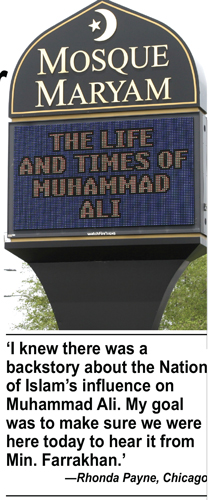
Ms. Payne said she once met Min. Abdul Rahman Muhammad, who introduced Mr. Ali to Islam and also spoke at the mosque, when he was visiting Chicago and Bro. Rahman Muhammad showed her a championship ring that the boxer had given him.
“I knew there was a backstory about the Nation of Islam’s influence on Muhammad Ali. My goal was to make sure we were here today to hear it from Min. Farrakhan,” she said.
Imam Khalifah Islam of Chicago’s Masjied Al Lateef stood outside Mosque Maryam peering into the crowd that flowed out of the building and reflected on his journey in Islam. He told The Final Call the meeting was “a beautiful way to spend the seventh day of Ramadan and be around Muslims who are from the same mud and the same blood,” referring to Black people in America.
He was serving in Viet Nam when Mr. Ali refused to be drafted and recalled the boxer’s strong words that “really registered. Allah was reeling me into Islam back then,” he said.
Imam Khalifah described the Minister’s message as an historical narrative that put into context the impact of the Hon. Elijah Muhammad on the boxer that counters the narrative of Mr. Ali’s life by today’s media. But he was moved just as much by the Minister’s growth, especially the Minister’s refusal to leave the teachings of his teacher.
He recalled attending a meeting in Youngstown, Ohio, when the Minister started rebuilding the Nation of Islam and stood alone. The imam saw him years later during a memorial service for the late Imam Warith Deen Muhammad, son of the Hon. Elijah Muhammad.
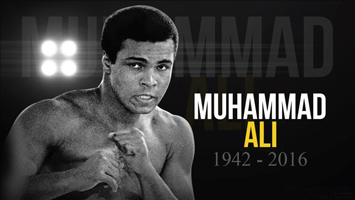
“He had an army of men around him then, but more importantly, he had Allah with him,” he said.
DeLeon Allen, 24, of Gary sat along the rail outside the mosque in deep reflection saying she thinks she’s found something she’s been looking for.
“I’ve been going to churches and always felt that I was missing something, that there’s an emptiness in my spirit,” she said. “When you hear the word (of God), something triggers in you when you know it’s the truth. Listening to Min. Farrakhan, those triggers were being hit and the people were so family-like. I’m starving for the true knowledge I’ve been missing,” she said.
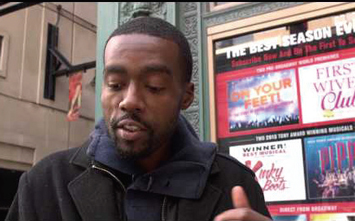
Ms. Allen put her own spiritual journey into the context of what she heard about Muhammad Ali’s life.
“The fact that for Ali and others who turned away from the teacher and things didn’t go so well showed me that you have to fight for what you believe. When I go deep into this I know I have to be willing to die for it because the enemy is always on the attack.
“Where I stay there’s a lot of hopelessness and it’s hard for me to stay strong. I asked my Most High God what should I do and He said you have to put yourself around other people. I’m trying to save people who don’t want to be saved, but that’s ok, I’ll have to come back for them but I have to learn some more,” she said.
Ms. Allen nearly broke down in tears when she spoke of the Minister’s salute to Black women.
“When he talked about the woman being pregnant and men walking away and for us to stay strong, I finally felt appreciation for me and all other women,” she said.
Kiara White wore a Black Nike hoodie as she withstood the stiff breeze outside the mosque. The graduate student at the University of Illinois at Chicago said she didn’t know Mr. Ali was once warned to quit boxing, “but I do believe he was a good student of the Hon. Elijah Muhammad and wasn’t afraid to speak his mind.”
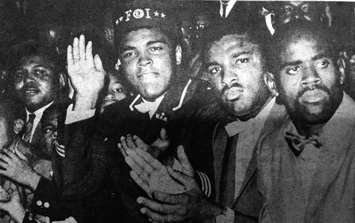
She said she broke into tears when Min. Farrakhan tearfully talked about painful periods in his own life. “When the Minister broke into tears I cried myself. I felt it was a real moment he was feeling about the Hon. Elijah Muhammad and how he took the path to follow his teacher” even though there might be death threats, she said.Corey Hendrix, a Chicago actor who appeared in the Spike Lee film “Chiraq” and other television shows, said the Minister’s message revealed stories people don’t hear about Muhammad Ali.
He said the mis-portrayal of Black heroes in the media has been going on forever. The status quo didn’t love Muhammad Ali when he was opposing the war or speaking for his people, he said. Hindsight is 20-20 and the Minister (Farrakhan) is trying to make sure we don’t lose sight of that, he said.
Mr. Hendrix said he was an extra in the film “Ali” with actor Will Smith, and though Mr. Smith did a good job, “the movie still felt kind of empty.”
If Mr. Hendrix were to make a movie about Mr. Ali today, “I’d show his real effect on people. His being an ambassador for the Nation of Islam and Islam on a grand scale but not really trying to be. His being that charismatic figure and taking the teachings the Hon. Elijah Muhammad gave him and shaking up the world.
“His legacy is so much bigger than what he did in the ring,” Mr. Hendrix said. “He’s arguably the most notable Muslim in the world, but I don’t think that was his goal. He was for humanity but that started with his Blackness.”
Nasir Malim, a visiting medical student from Los Angeles whose family is in India, said a lot of people who would have hated Muhammad Ali in his formative years were waving the flag at his funeral.
An African American history major in undergraduate school, Mr. Malim said Whites have tried to dilute Mr. Ali’s legacy as they have other strong Black leaders after they have died.
He said if Malcolm X and Muhammad Ali went a separate way from their teacher, “it was from a very conscious decision and I respect that, but in terms of their origin and who shaped them to become great figures, I think it’s necessary to recognize the importance of the Hon. Elijah Muhammad.”
(James G. Muhammad is a past editor-in-chief of The Final Call Newspaper.)












